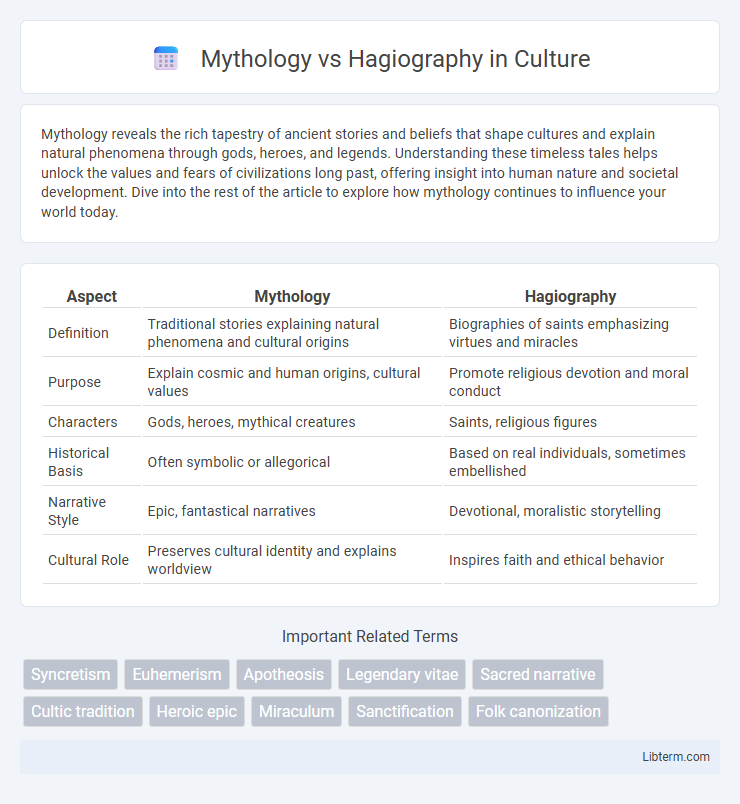Mythology reveals the rich tapestry of ancient stories and beliefs that shape cultures and explain natural phenomena through gods, heroes, and legends. Understanding these timeless tales helps unlock the values and fears of civilizations long past, offering insight into human nature and societal development. Dive into the rest of the article to explore how mythology continues to influence your world today.
Table of Comparison
| Aspect | Mythology | Hagiography |
|---|---|---|
| Definition | Traditional stories explaining natural phenomena and cultural origins | Biographies of saints emphasizing virtues and miracles |
| Purpose | Explain cosmic and human origins, cultural values | Promote religious devotion and moral conduct |
| Characters | Gods, heroes, mythical creatures | Saints, religious figures |
| Historical Basis | Often symbolic or allegorical | Based on real individuals, sometimes embellished |
| Narrative Style | Epic, fantastical narratives | Devotional, moralistic storytelling |
| Cultural Role | Preserves cultural identity and explains worldview | Inspires faith and ethical behavior |
Defining Mythology: Origins and Functions
Mythology encompasses traditional narratives that explain the origins, history, and customs of cultures, often featuring gods, heroes, and supernatural events. These stories serve fundamental functions such as providing explanations for natural phenomena, establishing cultural values, and reinforcing social cohesion. Unlike hagiography, which focuses specifically on the lives and virtues of saints, mythology addresses broader cosmological and existential questions within a cultural context.
Understanding Hagiography: Purpose and Evolution
Hagiography primarily serves to document the lives and virtues of saints, providing inspiration and moral guidance rather than historical accuracy. Over time, it evolved from simple biographical accounts into detailed narratives that emphasize spiritual lessons and divine intervention. This evolution reflects its purpose to reinforce religious devotion and uphold ecclesiastical authority through idealized portrayals of holy figures.
Key Differences Between Myths and Hagiographies
Mythology comprises traditional stories that explain natural phenomena, origins, and cultural beliefs, often involving gods and supernatural beings, while hagiography specifically narrates the lives and virtues of saints or religious figures to inspire faith. Myths primarily serve to convey cultural values and cosmological explanations, whereas hagiographies aim to document and promote spiritual exemplars within religious traditions. The factual accuracy in mythology is less emphasized compared to hagiography, which often blends historical elements with devotional embellishments.
Cultural Contexts: Mythological Figures vs Saints
Mythological figures often embody archetypal themes and cultural values, shaping collective identity through symbolic narratives rooted in ancient traditions. Saints, in contrast, serve as exemplars of moral and spiritual ideals within religious contexts, their stories reinforcing doctrinal teachings and community faith practices. The cultural contexts of mythology and hagiography deeply influence how societies interpret heroism, virtue, and the sacred, reflecting distinct modes of meaning-making across history.
Narrative Structures: Symbolism vs Historical Accounts
Mythology employs rich symbolism and allegorical elements within its narrative structures to convey universal truths and cultural values, often through gods, heroes, and fantastical events. Hagiography relies on historical accounts and documented life events of saints or religious figures, emphasizing moral lessons and spiritual exemplarity rooted in real-world contexts. The contrast lies in mythology's metaphorical storytelling versus hagiography's factual recounting with an intent to inspire faith and devotion.
Transformation of Heroes: Deities and Holy Men
Mythology transforms heroes into deities with supernatural powers and cosmic significance, while hagiography elevates holy men through moral virtues and miraculous deeds endorsed by religious traditions. In mythology, the hero's journey often culminates in divine transcendence, symbolizing universal truths and cultural values. Hagiographical narratives emphasize sanctity, spiritual transformation, and the embodiment of religious ideals, fostering veneration and faith among followers.
Ethical Lessons: Moral Influence of Myths and Hagiographies
Mythology imparts ethical lessons through symbolic narratives that explore universal human conflicts and virtues, shaping cultural ideals and moral reasoning. Hagiography, centered on the lives of saints, provides concrete examples of piety, sacrifice, and virtue, serving as direct moral exemplars for believers. Both genres influence moral behavior by embedding ethical teachings within engaging stories that inspire emulation and spiritual growth.
Impact on Art and Literature
Mythology shapes art and literature by providing archetypal themes, symbols, and narratives that explore human nature and the cosmos, influencing genres from epic poetry to visual arts. Hagiography impacts creative expression by venerating saints' lives, inspiring devotional art, moral allegories, and didactic literature that reinforce religious values and cultural identity. Both forms enrich cultural heritage, yet mythology emphasizes universal storytelling while hagiography centers on spiritual exemplars and ecclesiastical authority.
Role in Shaping Collective Identity
Mythology plays a crucial role in shaping collective identity by embedding cultural values, historical experiences, and shared symbols into timeless narratives that unify communities. Hagiography, on the other hand, reinforces collective identity through the celebration of saints' lives, promoting moral exemplars and religious devotion central to group cohesion. Both forms influence societal norms and collective memory, but mythology often addresses broader existential themes while hagiography emphasizes spiritual ideals and institutional continuity.
Contemporary Relevance and Interpretations
Mythology and hagiography continue to shape contemporary cultural narratives by providing frameworks for understanding human experience, identity, and morality. Mythological stories, often symbolic and universal, influence modern literature, psychology, and popular media by offering archetypes and existential themes. Hagiographies, centered on the lives of saints and religious figures, serve as moral exemplars and sources of spiritual inspiration, influencing religious practices and ethical discussions in present-day societies.
Mythology Infographic

 libterm.com
libterm.com